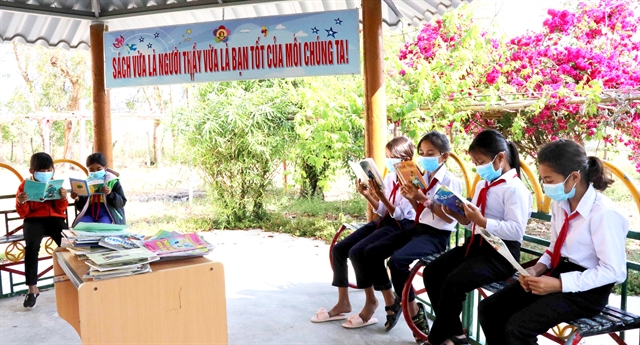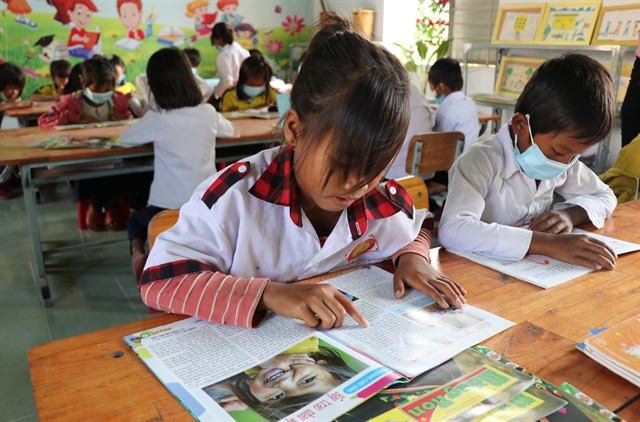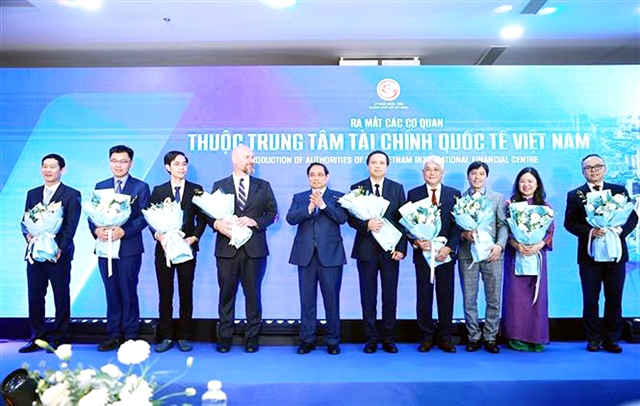 Society
Society

Ethnic children in Tây Nguyên (Central Highlands) Province of Gia Lai have significantly improved their Vietnamese language skills thanks to a new library system.

|
| Ethnic students in Trần Quốc Tuấn Primary School in Chư Drăng Commune of Krông Pa District enjoy reading in the school library. — VNA/VNS Photo Hồng Điệp |
GIA LAI — Ethnic minority children in Tây Nguyên (Central Highlands) Province of Gia Lai have significantly improved their Vietnamese language skills thanks to a new project on expanding "friendly libraries" in local classes and schools.
Setting up libraries in schools was one of the tasks to strengthen Vietnamese language for pre-school and primary school students in ethnic minority areas.
Since it was launched five years ago, speaking, reading and writing skills of ethnic minority students in many districts improved.
In the 2020-2021 school year, Gia Lai Province has 300 primary schools and more than 600 small-scale school branches over several remote mountainous areas with a total of 6,000 classes and 165,000 students, of which half were ethnic minority.
These children suffer many difficulties and disadvantages, and have little opportunity to access advanced society, so their language skills are limited.
And because they are used to speaking in their own languages, and rarely attend kindergarten classes before school, lessons are difficult to understand.
Gia Lai’s education sector is upgrading facilities and teaching equipment in primary schools.
Many schools set up their own libraries with a variety of books, comics and magazines to help students.
Schools also organised after-school activities such as singing competitions, reading festivals, drawing contests and stationery making competitions.
These activities were helpful and created excitement for ethnic students.
Trần Quốc Tuấn Primary School in Chư Drăng Commune of Krông Pa District which has five branches and nearly 600 ethnic students has seen improvements in the classrooms.
Đoàn Thị Thúy, school principal, said: “In order to make students more interested in going to class, the school was constantly creating a beautiful environment, especially with the library.
“We bought new books, magazines and comics to attract students to come and read, improving their language skills.”
Since the project was launched, the school found that students had developed well, and the quality increased year by year.
Ksor H’Bươi, a fourth grader, said: “After class, my friends and I often went to the library to read books.
“Many of my friends read faster and wrote better thanks to reading books and stories in the library.”
Developing libraries in schools and classrooms is a practical move by the local education sector. However, funding is limited so the books are modest with little supplementation and renewal every year.
Right now, only the main schools have built libraries but small branches have not been able to because of lack of funds.
Nearly 300 of Jrai ethic minority at Ia Jip school branch in Trần Quốc Tuấn Primary School don’t even have basic learning equipment, let alone a library.
The branch is 10km away from the main school and isolated from residential areas and has no internet access and little reading material.

|
| A variety of Vietnamese language magazines and books are available for the ethnic minority children to improve their command of the national language. — VNA/VNS Photo Hồng Điệp |
This means students speak only in their mother tongue and were reluctant to talk in Vietnamese.
Fortunately, the school will soon have a small library thanks to the Đinh Hữu Dư Bookcase Initiative set up by Vietnam News Agency’s Youth Union.
Chu Sỹ Lin, deputy head of education and training department of Krông Pa District said over the last five years, reading habits and quality improved year by year.
However, in schools in remote and isolated schools, there was a lack of resources, so the education department often called for sponsors to help the children. — VNS




